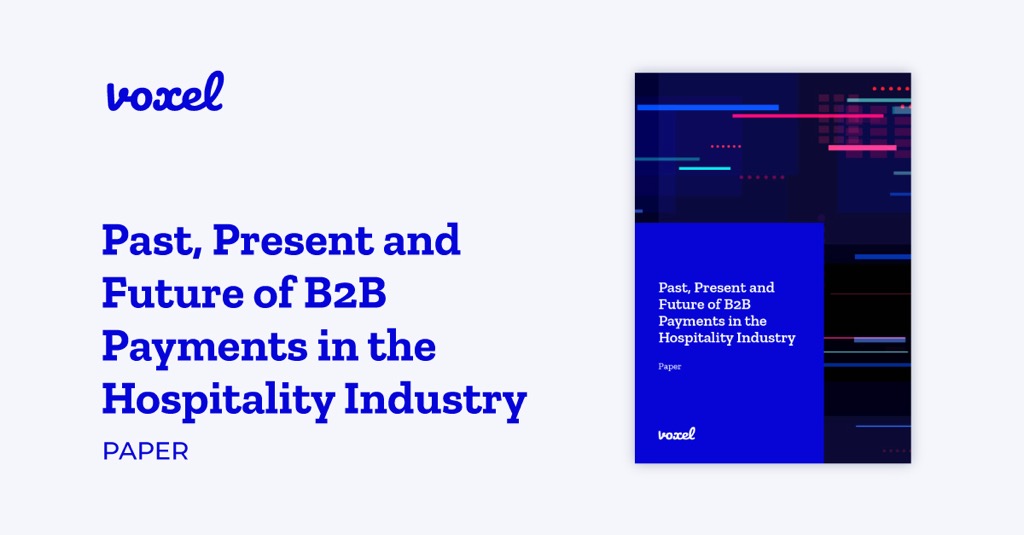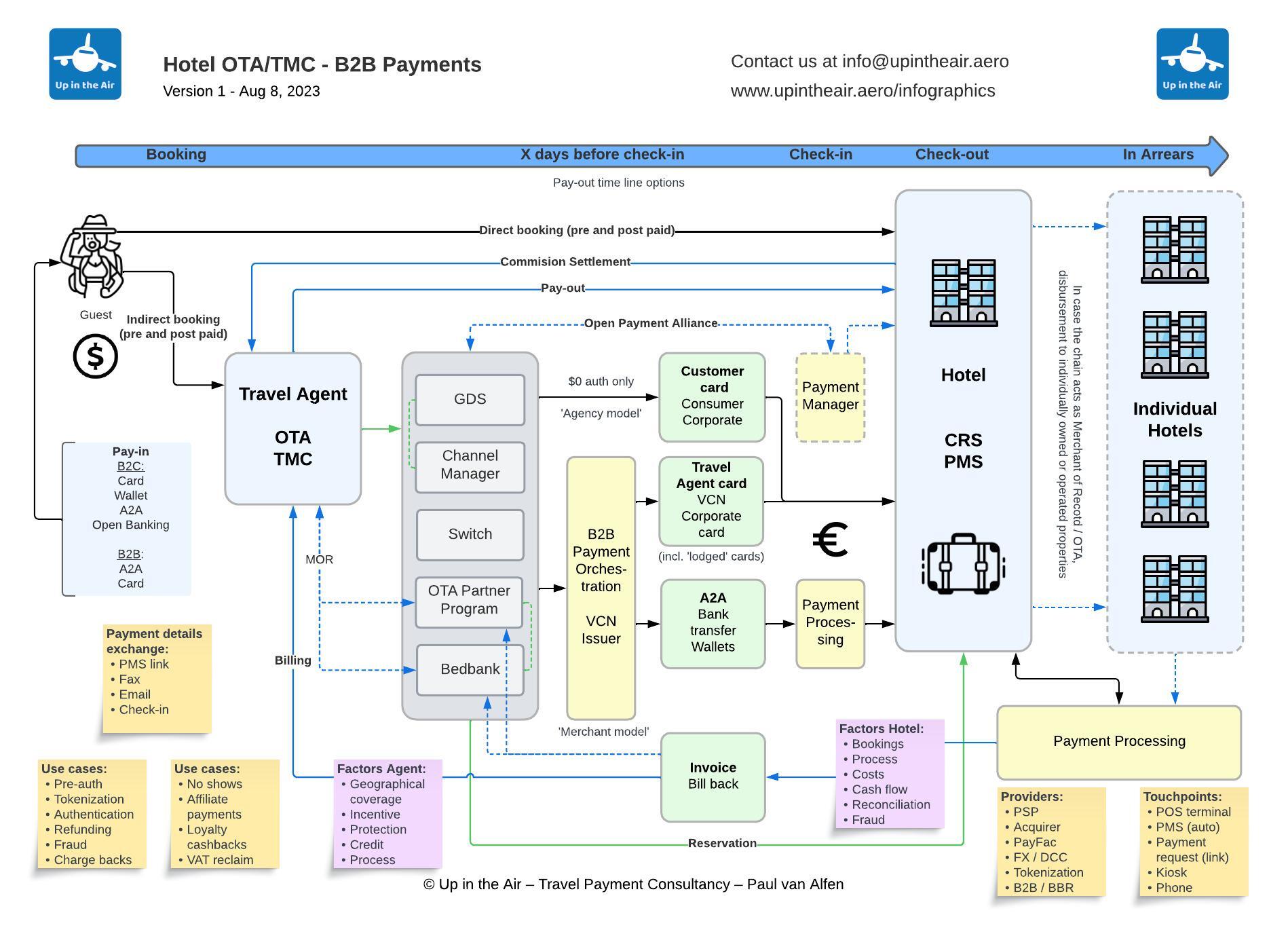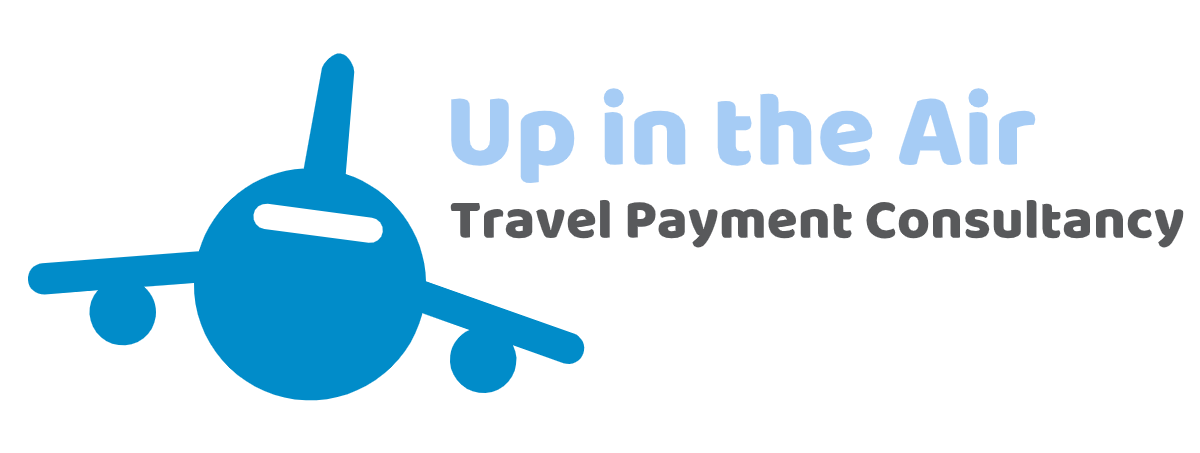After creating multiple infographics about B2B payments for Airlines, this is my first attempt to introduce the main other (and even more complicated) B2B use case in Travel: Hospitality.
How are reservations made and what are the links in the chain to move money between Travel Agents, Bed Banks and Hotels / Accommodations? Who plays what role?
I do realize that this is the domain of long time Hospitality industry subject matter experts (which I’m not), but I think it’s fair to say that this topic is mostly a ‘black box’ for other stakeholders in the Travel payment ecosystem. With this infographic, I try to create a high level overview, by simplifying the process and combining some of the steps. It’s therefore on purpose not complete and also not fully self-explanatory. The idea is that it provides a framework that will support the journey to a better understanding of the different components and how the dots are connected.
Before checking out the infographic, first some background:
- Travel agencies can basically adopt 2 models: ‘agency’ and ‘merchant’
- Agency is reservation only and typically results in a post payment by the guest (at check-out) but can also be a pre-payment processed by the hotel. In both cases the Agent’s commission is collected at a later stage by invoice
- ‘Merchant’ is a prepayment (typically at the time of booking) whereby the Travel Agent receives the transaction amount from the customer and then pays out to the hotel in a second step / at a contractually agreed time, either by (Virtual) Card, bank transfer (A2A) or by funding a wallet
- Hotels typically expect to be paid in their local currency, which in many cases is different than the customer’s home currency. In a merchant model an Agent can price in the customer’s currency and also offer local/alternative forms of payment, both leading to a higher check out conversion and a better UX
- In between the Agency and the hotel can be multiple distribution channels / partners, like Bed Banks, Booking.com / Expedia Partner programs and Channel Managers who might play a role in processing payments and collecting commissions. In all cases payment details will have to flow end to end / to the hotel in a secure manner (ideally tokenized), also to cover e.g. no show scenarios
- Chain hotels are not a ‘one size fits all’, they can be fully owned or individually owned, centrally or locally operated. Hotels in many cases have their own direct contracts with (local) acquirers
What types of B2B payments are being used and how do they compare?
- Similar to the Airline industry, also Hospitality relies heavily on (corporate and virtual credit) cards and the product and processing characteristics that come with them. To give some examples: multi-channel, multi-currency, cross border, credit, protection, perks, deposit at check in (‘pre-auth’), fully automated processes and integration with PMS’s
- To push funds to established hotel relationships, TA’s can also use local bank transfers, facilitated by specialized payment partners, circumventing the slow and expensive SWIFT rails
- In markets where local wallets are the primary payment mechanism, pay outs can also be made directly into the hotel or accommodation owner’s wallet (like Alipay in China)
- Invoices are used to collect commissions for ‘agency’ bookings but in some cases also for ‘merchant’ bookings (when the gross amount is paid out not to disrupt the reconciliation process)
- A complete scorecard will be required to do a proper apples vs. apples comparison between the 4 forms of payments (my next infographic!), but it’s clearly not all about direct costs. Process, reporting, reconciliation, cash flow, credit, coverage and incentives all play a role, seen from both an Seller and Supplier perspective
- Agents more and more make use of ‘pay-out’ orchestration, whereby in real time for an individual booking the best suitable form of payment is selected (based on e.g. acceptance policy of the hotel, costs/rebate and cashflow) and with the help of API’s a virtual card can be generated and inserted in the reservation
Special thanks to Ana Arjones at Mastercard Enterprise Partnerships, Koert Grasveld at TerraPay and Paul Beukers at Katanox for their input during the vetting!
Feel free to comment, pretty sure that there are more angles to include, topics to discuss!
#b2bpayments #travelpayments #fintech #hedna #htng #hoteltechnology

PS. For a deep(er) dive into this topic I recommend downloading ‘Past, Present and Future of B2B Payments in the Hospitality Industry’, by Voxel


